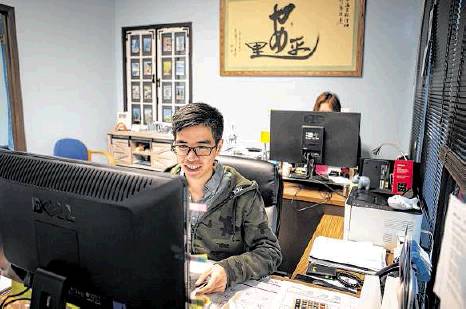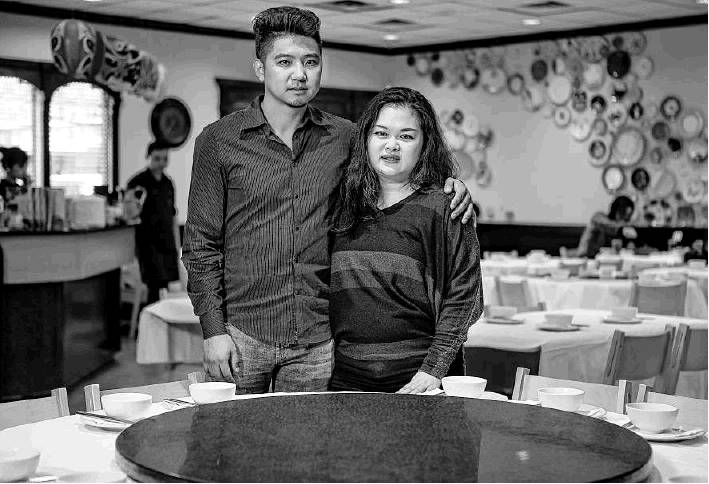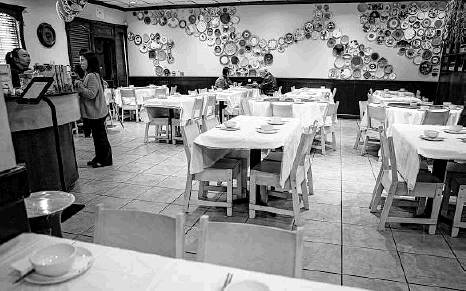Coronavirus fears deal heavy blow to Houston economy
Oil prices fall, customers stay home despite no confirmed cases of deadly illness in area
By Erin Douglas and Paul Takahashi STAFF WRITERS
Although there are no confirmed cases of the coronavirus in Houston or Texas, the fears it has stoked are reverberating through the local economy, hitting awide range of businesses from energy companies to travel agencies to restaurants to medical offices.
The manager of a Houston travel agency that books flights between Houston and China is canceling dozens of tickets. A real estate agent marketing condominiums near the Katy Asian Town shopping district postponed a promotional Lantern Festival event to avoid raising virus concerns among potential buyers
A foot and ankle doctor in Chinatown said half of her clients canceled their appointments after false rumors of a local coronavirus case began circulating on social media. At Asian supermarkets and restaurants all over Chinatown, grocery aisles and dining tables sat empty as customers holed up at home.
“I have been in Chinatown since the 1980s, and this is the worst time I’ve ever seen,” said Kenneth Li, chairman of the Southwest Management District, which covers almost half of Chinatown. “And we’ve been through SARS and Harvey.”
SARS, a respiratory illness that broke out in China in the early years of this century, was caused by an earlier strain of coronavirus. A new coronavirus believed to have originated in Wuhan, a city of 11 million people in central China, has killed at least 490 people and infected more than 24,000 globally, triggered quarantines and travel bans in China and halted business in the world’s second largest economy.
Travel between Houston and China has come to a screeching halt. Commercial airlines suspended flights between Houston and China, prompting waves of cancellations at local travel agencies. Several energy companies told employees to avoid business travel to China, and last month, China banned all group tourism travel sales.
Pally Travel, a Chinatown travel agency popular with Chinese immigrants, usually starts booking tickets in January for the busy summer season, when the agency can sell upward of 1,000 tickets between Houston and China. But instead of arranging flights and tours for tourists and business travelers, the agency is canceling as many as 50 tickets a day since the coronavirus broke out.
With every airline cancellation, the agency must refund its commission, manager Dylan Li said.
“I don’t think people are going back to China this summer,” Li said. “They don’t want to take the risk.”
Travelers from China represent Houston’s fifth largest inbound tourist group, according to Houston First, the city’s convention and tourism agency.
While other countries send more tourists to Houston, China sends bigger spenders. Chinese travelers to Houston spent $158 million in 2018, and the average Chinese traveler spends as much as $5,000 per person per trip, compared with about $1,200 for Mexican tourists.
“(The coronavirus) caused us to put a pause on developing the Chinese market while we see how this situation unfolds,” said Jorge Franz, Houston First’s senior vice president of tourism. “People are putting off their plans for more than just the short term. The Chinese are being cautious.”
That caution is also affecting Chinese real estate investors, said Josie Lin, a real estate agent in Chinatown and Katy Asian Town.
China is the top foreign buyer of U.S. residential real estate, spending $13.4 billion nationally in 2019. Chinese investors bought more than 500 homes across Texas last year.
But with travel bans imposed and Chinese embassies closed, many of those investors cannot travel or get documentation to complete real estate deals in Houston, Lin said. A couple of her Houston deals have fallen through as a result, she said.
Chinatown a ghost town
Business in Chinatown restaurants and supermarkets has fallen as much as 80 percent as still unfounded fears of the virus scare away customers, said Bin Yu, chairman of the Asian Chamber of Commerce.
Chinatown’s typically bustling plazas packed with cars are eerily quiet.
Foot traffic at Jusgo Supermarket fell by three quarters after a false rumor claiming Houston authorities shut down the Chinatown supermarket because of concerns about the coronavirus circulated on Chinese social media platform WeChat. The owner, Feng Chen, has since hired a law firm to go after the perpetrators of the rumor, which has caused his supermarket to lose between $20,000 and $30,000 daily over the past week.
Food delivery startup UUeat, which delivers meals from 60 Asian restaurants in Chinatown, Katy and Sugar Land, reported a 50 percent decline in business. The Houston company has waived its $3 to $5 delivery fee to drum up online food orders.
“It’s like nobody is going out and they’re not even ordering online,” Chief Executive Charles Chen said. “People just disappeared.”
Mala Sichuan Bistro, a popular Sichuan-style restaurant in Chinatown, served 173 customers on a recent Saturday, down from about 500 customers a year earlier. The company’s other locations in Montrose and Katy have fared better, said owner Cori Xiong, but her plans to open a fourth restaurant in Sugar Land were postponed because a furniture order from China was delayed due to the coronavirus outbreak.
“The diversity and inclusiveness of Houston is what makes us one of the greatest multicultural centers in the country. The Chinese American community is an integral part ofthat,” Xiong said. “During this time, we need to support our Chinese American neighbors and businesses more than ever.”
Another hit to crude
As China’s economy slows in response to the pandemic, demand for crude is expected to fall, putting more pressure on oil prices and energy companies already cutting spending and jobs. With oil prices hovering between $50 and $60 a barrel for much of last year — barely breakeven for many companies — Texas energy firms cut payrolls last year by nearly 10,000 jobs, or 4 percent, according to government statistics.
The prospect of weak oil demand sent prices plunging below $50 a barrel Tuesday, its lowest level in more than a year. Wood Mackenzie, an energy research firm, this week lowered its forecast for global oil demand in the first quarter by 500,000 barrels per day, half of which could be driven by lower demand in China because of the coronavirus.
Economists said the coronavirus impact to both oil prices and Houston’s economy will likely be limited to the first quarter, but that could change if the outbreak worsens.
“The oil price decline is detrimental to Texas if it persists,” said Ray Perryman, a Waco economist. “A prolonged crisis could clearly cause major economic challenges.”
Oil prices have fallen about 20 percent over the past month. They rebounded Wednesday on hopes that OPEC will cut production further, settling at $50.75 abarrel in New York.
Trade issues over? Not so fast
Trade between the U.S. and China was set to improve after the countries last month agreed to a phase one trade deal, easing tariffs and long-simmering tensions.
Houston’s economy was poised to reap the benefits of de-escalating trade tensions — until the coronavirus broke out. The virus is expected to weaken demand for U.S. exports and exacerbate lingering effects of the trade war and a broad economic slowdown in China.
“This is just one more thing (the Chinese economy) has to deal with,” said Patrick Jankowski, chief economist for the Greater Houston Partnership, a business-financed economic development group.
China is Houston’s third largest trading partner after Mexico and Brazil, which overtook China’s No. 2 spot amid the trade war. Trade between Houston and China in the first 11 months of 2019 fell to $13.8 billion, down more than 25 percent compared with a year prior, according to government statistics.
Houston’s top exports to China include crude oil, liquefied natural gas, chemicals and plastics — all of which are closely tied to global economic growth and are sensitive to market disruptions.
U.S. LNG companies have been particularly rattled as Asian spot LNG prices hit a record low. China hasn’t received an LNG shipment from the U.S. since April amid the trade war.
Olivia Tallet contributed to this report. erin.douglas@chron.com paul.takahashi@chron.com


